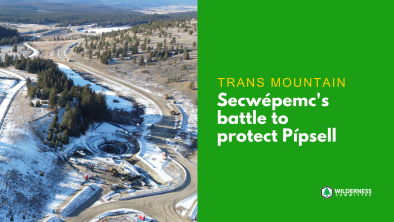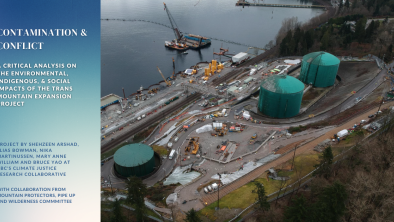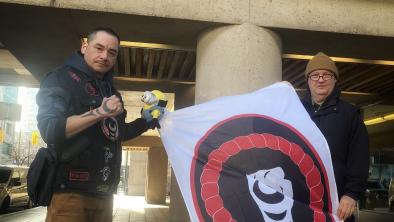Who Will Defend Our Coast?

The Georgia Straight
By Ben West
November 9, 2012
October 22 was an amazing and inspiring day. On a cold Monday morning, thousands of B.C. residents came together in front of the legislature in Victoria to show their opposition to the export of tar-sands bitumen across the province and through our coast.
Our provincial government buildings sat empty on this historic day, because our premier had cancelled this legislative session. The symbolic image of the legislature left empty begs the question, who is really defending our coast?
British Columbians have been frustrated with the lack of leadership on this issue and continue to wait for someone to step up to champion this cause.
Two days later, I got a chance to speak with the provincial leader of the opposition, Adrian Dix, at his Vancouver-Kingsway constituency office. At the same time, actions were taking place at over 60 constituency offices across the province, calling on our provincial leaders to "Defend our Coast."
This not only gave folks who couldn't make it to Victoria a chance to show that they too oppose the proposed Enbridge and Kinder Morgan tar-sands pipeline projects, but some MLAs, including Dix, opened their doors and invited people in to discuss the issues.
The B.C. NDP has stated its opposition to the Enbridge Northern Gateway Pipeline and the party's MLAs have announced their intention to take back control of the approval process by conducting their own "made in B.C." environmental assessments—which would give them the ability to block the project from going forward.
They have also made it clear that, in regard to the Kinder Morgan pipeline proposal, they would ensure a “made in B.C.” assessment for that project as well.
The Houston-based megacorporation, Kinder Morgan, has quietly been trying to set itself up as the alternative to Enbridge. This company is owned by two former Enron executive billionaires, Richard Kinder and Bill Morgan, who were smart enough to leave Enron—taking with them millions of dollars—and then purchasing a subsidiary company, Enron Liquid Pipelines LLP, which has turned into the biggest pipeline company on the continent.
These Enron alumni bought B.C.'s only oil pipeline, the Trans Mountain pipeline, which we have been using to supply 90 percent of our oil consumption in the province since the 1950s.
Around the time that Kinder Morgan bought the pipeline in 2005, we began to see a shift toward increased tar-sands extraction as traditional oil supplies dried up and nonconventional and dirtier sources became profitable. Since then, the company has unassumingly been transforming the pipeline and the Vancouver harbour into an export route for tar-sands oil.
Already the corporation is limiting the amount of oil going to supply the local Burnaby refinery in order to export more raw bitumen. We already have seen an increase from 20 tankers a year—mostly taking oil to be refined in California and then brought back for our consumption at home—to 80 tankers per year since 2005.
The increase has explicitly been for the sake of export profits for Kinder Morgan, not for local consumption. Each of these tankers carries three times as much oil as was spilled by the Exxon Valdez.
Now this company wants to build a new pipeline about the same size as the Enbridge pipeline, along the same Trans Mountain route through what are now B.C.'s most heavily populated areas. This would result in at least 750,000 barrels per day going through the pipeline and more than 300 tankers a year in the Vancouver harbour.
The NDP has yet to take a strong and clear position against this proposal. At Dix's office this week, I questioned him on his party's stance on the proposal. I brought up the NDP's submission to the National Energy Board regarding the Enbridge Northern Gateway pipeline, which focused heavily on "Dutch Disease"—the economic principle that basing your economy on exporting raw resources actually hurts your manufacturing sector and ultimately is bad for jobs and the economy.
I asked this potential premier what difference he saw between the Kinder Morgan pipeline and the Enbridge pipeline in terms of "Dutch Disease", and asked if they would take a consistent position and oppose both pipelines.
He didn't really answer my question, but instead said that the differences between these two projects were their timelines, namely that Kinder Morgan has not yet formally applied to the National Energy Board for approval.
I smiled a little, remembering the sign a local resident had been holding up outside his office that said "No slick talk".
The fact is, Kinder Morgan has already started hosting dozens of "open houses" with members of the public all along the pipeline route. It has also filed a "tolling application" with the National Energy Board, which would set the rate of compensation for stakeholders along the pipeline route.
And the NEB has actually announced that First Nations, environmental groups, and local landowners couldn't be interveners at these tolling hearings. The right to participate was only granted to municipalities and other industry members, such as oil companies.
This is putting the cart before the horse by negotiating compensation before even proposing the details of the project, and it should be reason enough to be outraged. It is proceeding with the proposal as if in the midst of an environmental review and public-consultation process, but there is no such project underway.
In fact, the company has yet to even produce a map of their proposed pipeline route.
Dix did state that his party was open to opposing the pipeline if the results of a “made in B.C.” assessment showed that the project shared the same flaws as Enbridge's proposal. That is good, but not good enough.
The City of Vancouver and Burnaby led the way by opposing this project months ago, and a couple weeks ago the Union of B.C. Municipalities voted to oppose all increases to tanker traffic off the B.C. coast.
The local Coast Salish First Nations have been outspoken in their leadership opposing these projects. Furthermore, a number of big unions have stated their opposition including, among others, the Alberta Federation of Labour and the Communication Energy and Paper workers (C.E.P.), which represents workers at the Chevron refinery in B.C. and workers in the Alberta tar sands.
The NDP may be keeping an open mind, but this experience should serve as a reminder that we need to pressure all of our elected leaders to defend our coast...all of it.
We also need those representing us to defend our climate, as either one of these projects would push us further down the road toward increased fossil-fuel dependence instead of getting us on the path to a sustainable and ethical local economy.
At the NDP’s 2012 convention, the party chose the passionate green jobs and social-justice advocate Van Jones as the keynote speaker. We need a province based on these kinds of ideas, good new sustainable jobs in a new economy. As of yet, we are seeing no indication this will become a reality.
As Van Jones points out in his book Reclaim the Dream, former U.S. president Franklin D. Roosevelt did not bring in the New Deal simply because he wanted to. He was pressured to do it by strong social movements.
The same could be said for every major social change throughout history: the civil-rights movement, woman's suffrage, the creation of the Environmental Protection Agency, and so on. No matter who you support, we need to call on all political candidates to do the right thing and reject these pipeline proposals.
Progressive politicians may be more open to listening and be more likely to act on the concerns of citizens, but at the end of the day, it's up to us to organize the social movements required to make change. The Defend our Coast actions were a historic moment in these campaigns, but there is still a long way to go and a lot of work to be done.
We are going to keep the pressure on with more of our own town-hall meetings, educational reports, and other activities. We need all of the province’s elected officials to defend our coast, and to be champions of green jobs for the sake of our collective good.


